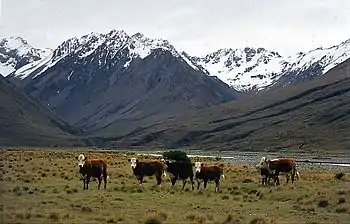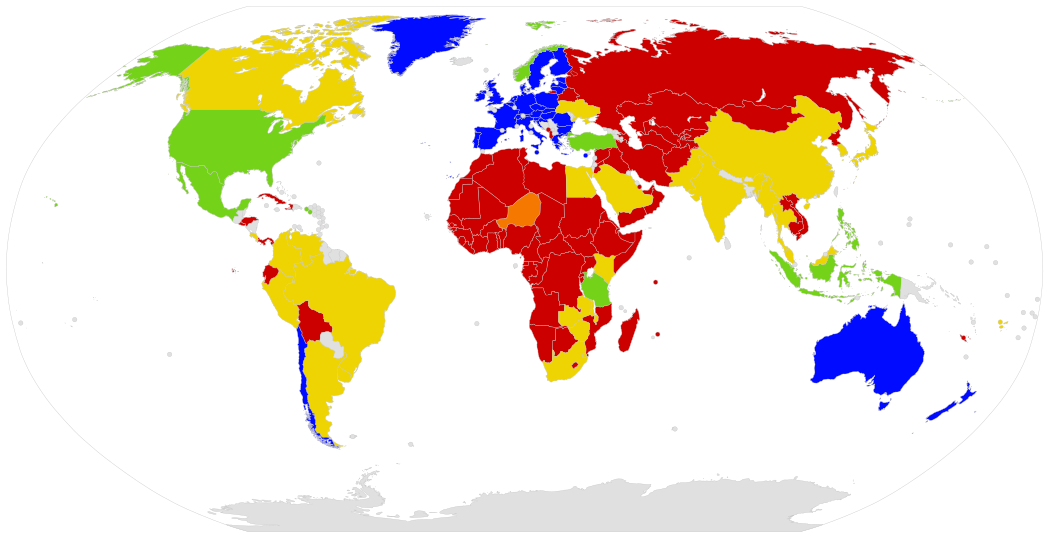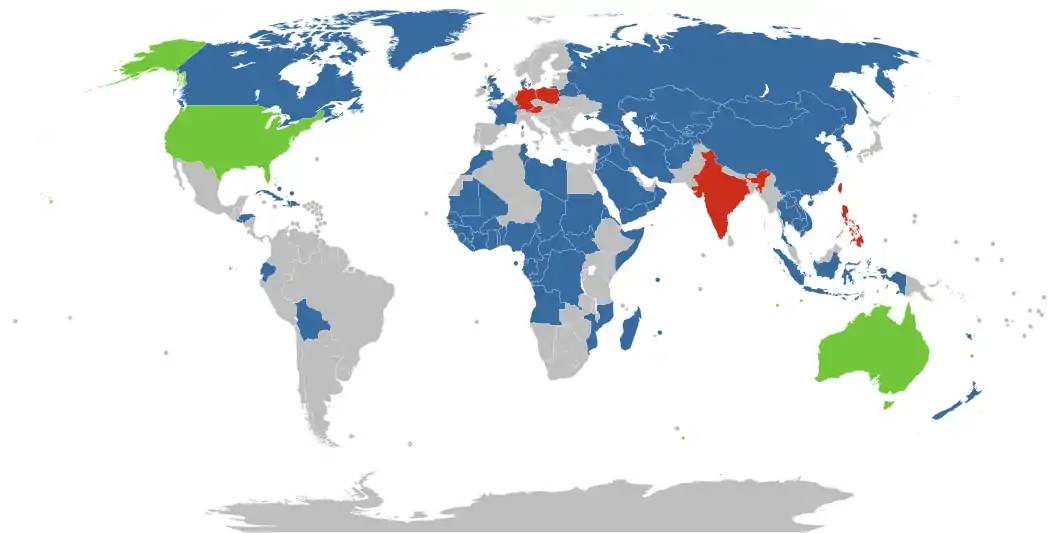Animal welfare in New Zealand
Animal welfare in New Zealand is governed by the Animal Welfare Act 1999 and a number of organisations actively advocate for both animal welfare and animal rights. Pest control and farming practices have been scrutinised with respect to animal welfare issues. The legality of killing dogs and cats for consumption has also been criticized.

Animal welfare issues

| | National recognition of animal sentience | | Partial recognition of animal sentience1 |
| | National recognition of animal suffering | | Partial recognition of animal suffering2 |
| | No official recognition of animal sentience or suffering | | Unknown |
2only includes domestic animals

| | Dog killing is legal. | | Dog killing is partially illegal.1 |
| | Dog killing is illegal. | | Unknown |
The New Zealand economy relies heavily on agriculture and many animal welfare issues involve the farming sector.
Despite claims that New Zealand has high animal welfare standards, a 2016 report from the National Animal Welfare Advisory Committee, reviewing the use of farrowing crates on pig farms, found that the pork industry does not accept its requirements under the Pigs Codes of Welfare (2010), and that failure by industry to act in accordance with the Pigs Codes of Welfare (2010) is commonplace.[1] Additionally, the Pigs Codes of Welfare (2010) contradicts animals rights to express normal patterns of behavior as outlined in the Animal Welfare Act 1999.[2][3][4]
There were animal welfare concerns on the controversial CraFarms and in June 2011 five people involved with Crafers Taharua Dairy Farm pleaded not guilty to 714 charges of alleged animal welfare offences.[5]
In 2013 a farmer was convicted of animal welfare offences after breaking or injuring the tails of 230 cows and he was banned from owning cows. The case was the worst of its type that had been seen by the authorities.[6]
A resource consent application under the Resource Management Act 1991 for the intensive farming of cattle in the Mackenzie Basin in 2009 attracted opposition because of concerns over animal welfare, even though animal welfare is not a part of the RMA. The application was "called in" under provisions of the RMA.
The usage of 1080 in New Zealand (a pest control and animal health measure) attracts some opposition on animal welfare grounds but a 2007 assessment of 1080 (sodium fluoroacetate) concluded that the benefits outweighed the risks.[7]
In 2010 Landcare Research New Zealand Limited prepared a paper for MAF Biosecurity New Zealand called "How humane are our pest control tools?".[8] Various vertebrate toxic agents such as 1080, Brodifacoum, Cholecalciferol and so on, kill traps in mammal species, in-burrow rabbit control methods and leg hold traps, rotenone, alphachloralose and DRC-1339 looked at the ‘animal welfare impact’ (humanness) of these control tools. The paper describes in detail how various toxins affect different animals. Information on level of consciousness at various times/events after dosing are still needed to fully assess its negative experiences and humanness.
Animal research
Animal research is regulated by the Animal Welfare Act 1999 and organisations using animals must follow an approved code of ethical conduct.[9] This sets out the policies and procedures that need to be adopted and followed by the organisation and its animal ethics committee (AEC).[10] Every project must be approved and monitored by an AEC which includes lay members.
Companion animals
In 2009, a Tongan man living in New Zealand cooked his dog in his back yard, which prompted calls to ban the practice, but this did not happen.[11]
Wildlife smuggling
New Zealand has a number of rare and endangered species and there have been cases of wildlife smuggling.
The Wildlife Enforcement Group, a group of three government departments, collectively investigate smuggling to and from New Zealand. The three agencies are the New Zealand Customs Service, the Ministry of Agriculture and Forestry and the Department of Conservation.[12]
New Zealand is a signatory to CITES (Convention on International Trade in Endangered Species of Wild Fauna and Flora) which was set up to ensure that international trade in specimens of wild animals and plants does not threaten their survival. CITES is administered by the Department of Conservation.
Organisations
A number of organisations in New Zealand actively pursue animal welfare issues.
The Royal New Zealand Society for the Prevention of Cruelty to Animals (RNZSPCA or more commonly, SPCA), the longest established animal welfare organisation in New Zealand, was formed in Dunedin in 1882 and was inspired by the English Society for the Prevention of Cruelty to Animals.
SAFE (Save Animals From Exploitation) is an animal rights advocacy group that has run a number of high-profile campaigns. SAFE ran a campaign against intensive pig farming featuring the comedian Mike King who had previously fronted an advertising campaign that promoted the sale of pork.
The international animal welfare charity, World Animal Protection has a branch in New Zealand.[13]
References
- https://www.mpi.govt.nz/document-vault/11959
- Wong, Simon (15 April 2016). "SAFE slams meaningless animal welfare reform". Newshub. Retrieved 7 September 2017.
- |url= https://www.mpi.govt.nz/document-vault/11959 |
- "Animal Welfare Act 1999 No 142 (as at 08 September 2018), Public Act Contents – New Zealand Legislation". Legislation.govt.nz. 2018-09-08. Retrieved 2020-01-17.
- Watson, Mike (30 June 2011). "Not guilty pleas to dairy charges". Taranaki Daily News. Retrieved 30 June 2011.
- Bayer, Kurt (20 February 2013). "Farmer banned from owning cows". The New Zealand Herald. APN. Retrieved 19 February 2013.
- New Zealand (2007). The reassessment of 1080 : an informal guide to the August 2007 decision of the Environmental Risk Management Authority. Wellington N.Z.: Environmental Risk Management Authority. ISBN 9780478215380.
- https://www.mpi.govt.nz/document-vault/4009
- Ministry for Primary Industries. "Guide to the Preparation of Codes of Ethical Conduct". Ministry for Primary Industries. Retrieved 1 September 2012.
- Ministry for Primary Industries. "Animals in Research". Ministry for Primary Industries. Retrieved 1 September 2012.
- Fox, Michael (2009-08-19). "In defence of dog eating – national". Stuff.co.nz. Retrieved 2012-10-24.
- Multi-agency effort to catch wildlife criminals
- World Animal Protection Canada, World Animal Protection. Accessed 25 June 2014.
Further reading
- Ministry of Agriculture, Forestry (2009). Animal welfare in New Zealand (PDF). [Wellington, N.Z.]: Ministry of Agriculture and Forestry. ISBN 9780478351170.
- Wells, N. E. (2011). Animal law in New Zealand. Wellington [N.Z.]: Brookers. ISBN 9780864726896.
External links
- Animal welfare at the Ministry for Primary Industries
- Animal Welfare Act 1999 at the Parliamentary Counsel Office
- Animal welfare at the New Zealand Veterinary Association
- Animal Welfare in New Zealand, VetLearn Foundation (subscription required)
- Story: Pets – Animal welfare history at Te Ara: The Encyclopedia of New Zealand
- Organisations